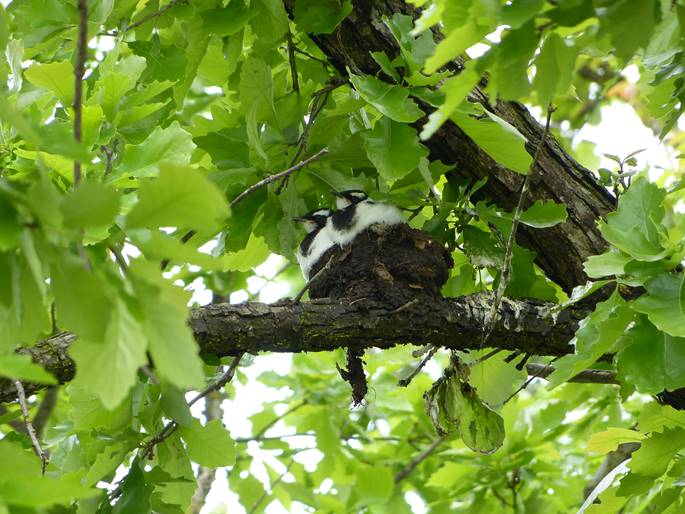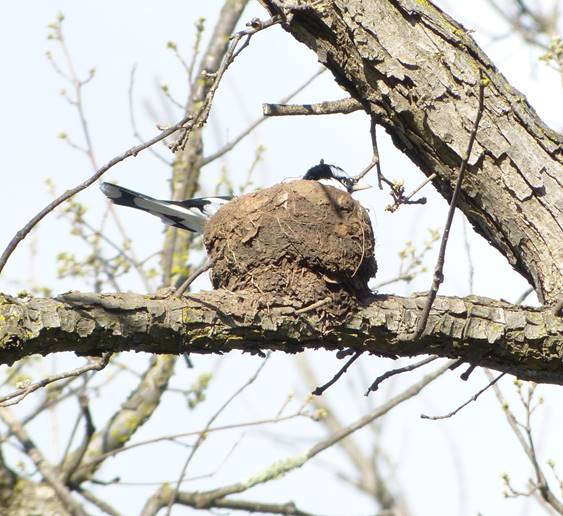This pair of Magpie Larks in Ainslie seem to have successfully raised three young:-
20 Sept on nest, 26 Oct. one fledged, two young still (just ) in nest).
Robin
 
From: calyptorhynchus [
Sent: Saturday, 19 September 2020 11:25 AM
To: Canberra Birds; Isobel Crawford
Subject: Re: [Canberrabirds] Magpie Lark nesting in deciduous tree
Ok so the Magpie Larks had us tricked all along!
I thought when I first saw the nest it was only half completed and that they had stopped. A couple of days ago I saw the female sitting on the nest, so thought that she must have laid. However today I saw the male feeding a chick (presumably)
in the cup of the nest, so the nest must have been active for at least a month!
If they can be that unobtrusive in the yard of a birdwatcher it proves they don't need the cover of leaves!
On Tue, 15 Sep 2020 at 23:16, Robin Hide <> wrote:
[Re-sending from original sent last Friday-as it didn’t seem to make it to the list]
Snap!
I’ve just noticed this one in the lamp post outside the National Library - to the right of the fountain -facing
out from the Library steps.
Robin
From: Lindell
Emerton
Sent: Friday, 11 September 2020 8:36 AM
To: Philip Veerman
Cc: Canberra Birds;
Subject: Re: [Canberrabirds] Magpie Lark nesting in deciduous tree
And some nest sites can be quite different. This one was in Elder Park, Adelaide, in September 2014, near the busy bridge across the Torrens River from the Convention Centre to
the Adelaide Oval.
These had used the open lamp post and I can’t understand why they continued with the nest building after the first night with the lights on.
I don’t know the outcome from this nesting attempt as I was only in town for a few days…..interesting.
On 10 Sep 2020, at 9:28 pm, Philip Veerman <> wrote:
Sure they usually nest in Eucalypts but they don’t choose particularly well shaded or hidden sites
within those trees either. Another case of note, also in Canberra, about 25 years ago, when some of the buildings in Woden town centre were being rebuilt, along the walkway between the main plaza and many buildings, a pair of Magpie-larks built their nest
on bare steel scaffolding, that was being used daily by construction workers carrying building materials and also passed by, by hundreds of people within a few metres 5 days a week, especially during lunch times (one of whom being me). The nest was about 3
metres above ground (the ground of course being concrete). The site was also a bit of a wind tunnel and potentially very cold, although also shaded by the building, from the potentially severe summer sun. When the necessary work was finished, the contractors
pulled down all the scaffolding above and beside the nest, in both directions, leaving just enough to be stable and not harm the nest, until a week or two later when the chicks fledged, when they came back to collect the rest. The whole of the nest building
and incubation period and early part of the NY period, there was construction work going on. The workers told me that this little act of kindness cost them a lot of money in costs of extending their equipment time there. The workers collectively paid for this
rather than the construction company. I also expect that even the thousands of office staff, only some of who would have noticed the birds (even though in those days people were not buried in nonexistent mobile phones), seen it from the beginning but if they
didn’t at the start, it was perfectly clear as to why some scaffolding had been left that extra week or so just to have not disturbed the birds.
Here in suburban Canberra we have Magpie Larks nesting in a deciduous tree in our backyard.
The nest is nearing completion, but at the moment the tree has not yet put out leaves (probably will have done so in a couple of weeks).
In previous years they (or other ML pairs) have nested in tall Eucalypts nearby, this is the first year they have nested here.
My question is, why built in a tree that is as yet a bare tree. Surely they can't know it's going to leaf in a few weeks and so the shade and protection might be better than a
native tree; at the moment there is no shade and no protection. Magpies often nest in deciduous trees, but Magpies are more formidable than MLs and can fight off more predators. Has anyone ever seen MLs nesting a dead native tree?
--
This is the email announcement and discussion list of the Canberra Ornithologists Group.
Emails posted to the list that exceed 2 MB (2,000 kB) in size, including attachments, will be rejected.
All emails distributed via the list are archived at http://bioacoustics.cse.unsw.edu.au/archives/html/canberrabirds.
It is a condition of list membership that you agree to your contributions being archived.
CanberraBirds mailing list
m("canberrabirds.org.au","CanberraBirds");" target="_blank">
http://canberrabirds.org.au/mailman/listinfo/canberrabirds_canberrabirds.org.au
--
This is the email announcement and discussion list of the Canberra Ornithologists Group.
Emails posted to the list that exceed 2 MB (2,000 kB) in size, including attachments, will be rejected.
All emails distributed via the list are archived at
http://bioacoustics.cse.unsw.edu.au/archives/html/canberrabirds. It is a condition of list membership that you agree to your contributions being archived.
CanberraBirds mailing list
http://canberrabirds.org.au/mailman/listinfo/canberrabirds_canberrabirds.org.au
--
John Leonard
Canberra
Australia
www.jleonard.net
‘There is kinship between people and all animals. Such is the Law.’ Kimberley lawmen (from Yorro Yorro)
|
 ATT00001.txt
ATT00001.txt
Description: ATT00001.txt
|

